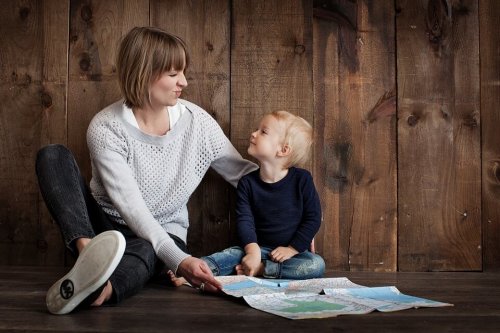The Most Common Questions that Kids Ask

Children seem to have unlimited curiosity. They question everything they don’t understand or that calls their attention. That’s why adults need to be prepared to respond confidently to the most common questions that kids ask.
Normally, kids start asking a lot of questions around age 3 when the left side of their brains starts to mature. Additionally, as they grow, kids start to look for logic in things, and they start to see the world differently.
Children’s endless questions can be tedious for parents. However, it’s a good sign that their brain is growing. In addition, it shows that their analytical skills are improving every day.
It can be exhausting to answer so many questions in a row. Therefore, you have to be prepared with lots of patience. Children are very curious to learn. The adults around them will always be their first choice to solve all their questions.
Benefits of curiosity in children
Here are some of the advantages of children asking lots of questions at this age:
- Stimulates their brain.
- Helps overcome anxiety.
- Favors interpersonal relationships.
- Increases the ability to learn new things.
- Increases interest in reading.
- Improves their communication skills.
Children can ask countless questions, varying in topics and complexity. Questioning why everything happens will become a daily thought in their lives.
This is especially true when they’re doing daily activities. For example, they might ask why they have to do their homework and chores or why the sky is blue.

Learning something new every day from family is always fun. The adults around them are guides, and they hold all the knowledge in the universe.
If parents respond negatively to all these questions, children might lose their curiosity and desire to learn. These are some of the most common questions kids have:
- Why does it rain?
- Why does our neighbor look different?
- Where do babies come from?
- Why does it snow?
- Why is the sky blue?
- How much salt is in the ocean?
- Why do people die?
- How come I have to do chores and homework?
- How do birds fly?
- Why do I have to go to school?
- Why do I need to eat vegetables?
- How are babies made?
This is a stage where children ask lots of questions. If you notice that your child is interested in something, you have to try to answer all of his questions in a simple way that’s age-appropriate.
How to answer common questions that kids ask
Answer with another question
Children need help thinking. Therefore, returning their question with another question could motivate them to think of a response. For example, say “What do you think?” or “Why do you think that happens?” It could lead to great answers.
Be careful talking about adult issues
When their questions are about adult topics, you should give small and concrete answers. Use language that children can understand.
Children’s endless questions can be tedious for parents. However, it’s a good sign that their brain is growing and their analytical skills are improving every day.
Don’t try to avoid them
Children ask lots of questions starting with the famous word: “Why?” You’ll need a lot of patience to answer them.
Answering incorrectly just to avoid talking isn’t a good method. Remember, curiosity will help children develop their intelligence, improve their language skills, and build confidence.
Common questions that kids ask can be difficult
There are lots of questions that you need to pay special attention to nowadays. For example, you need to watch for questions relating to abuse.
However, decades ago, a young child wouldn’t have asked who or what a pedophile or rapist is, but now it can happen.
This type of question can happen for two reasons. First, the child has heard the word on television or from a friend. Second, he read it on the internet.

These kinds of common questions that kids ask, like so many others, come from simple curiosity. Kids also look up to you to answer their questions honestly. It’s always better to explain these answers at home.
Events like terrorist attacks, wars, natural disasters and other unfortunate situations will surely generate questions from your child. Adults can do a lot here. Not only are you answering a simple question, but you can use this time to teach values and morals.
You need to have a lot of patience and intelligence to find the right words to explain these complex topics to your child. Therefore, with love and dedication, you can surely promote curiosity in your children so their desire to learn is endless.
All cited sources were thoroughly reviewed by our team to ensure their quality, reliability, currency, and validity. The bibliography of this article was considered reliable and of academic or scientific accuracy.
- Bernal A., & Román J. (2020). La curiosidad en el desarrollo cognitivo: análisis teórico. UNACIENCIA, 6(11), 116-128. Recuperado de: https://revistas.unac.edu.co/ojs/index.php/unaciencia/article/view/123
- Burgos, C. E., & González, M. D. (2003). La pregunta en la vida de los niños. COOP. EDITORIAL MAGISTERIO.
- Candelas M. A. (2011). Sobre las preguntas infantiles y su relevancia para el cambio educativo. EA, Escuela Abierta 14, 111-122. Recuperado de: https://ea.ceuandalucia.es/index.php/EA/article/view/83
- Londoño A. M. (2014). ¿Por qué preguntan los niños? Aproximación a la infancia, sus lenguajes y la pregunta. Master’s thesis, Universidad EAFIT. Recuperado de: https://repository.eafit.edu.co/handle/10784/2879
- Nieto C. R. (1992). La pregunta en la construcción del diálogo: funciones constructivas de las preguntas a los niños pequeños. Estudios de Lingüística Aplicada, (15). Recuperado de: https://ela.enallt.unam.mx/index.php/ela/article/view/213
- Tabares A. A. (2010). Filosofando con el poder de la pregunta: Una Perspectiva de la Filosofía para Niños. Entre comillas, (13), 30-41. Recuperado de: https://dialnet.unirioja.es/servlet/articulo?codigo=3365946
This text is provided for informational purposes only and does not replace consultation with a professional. If in doubt, consult your specialist.








